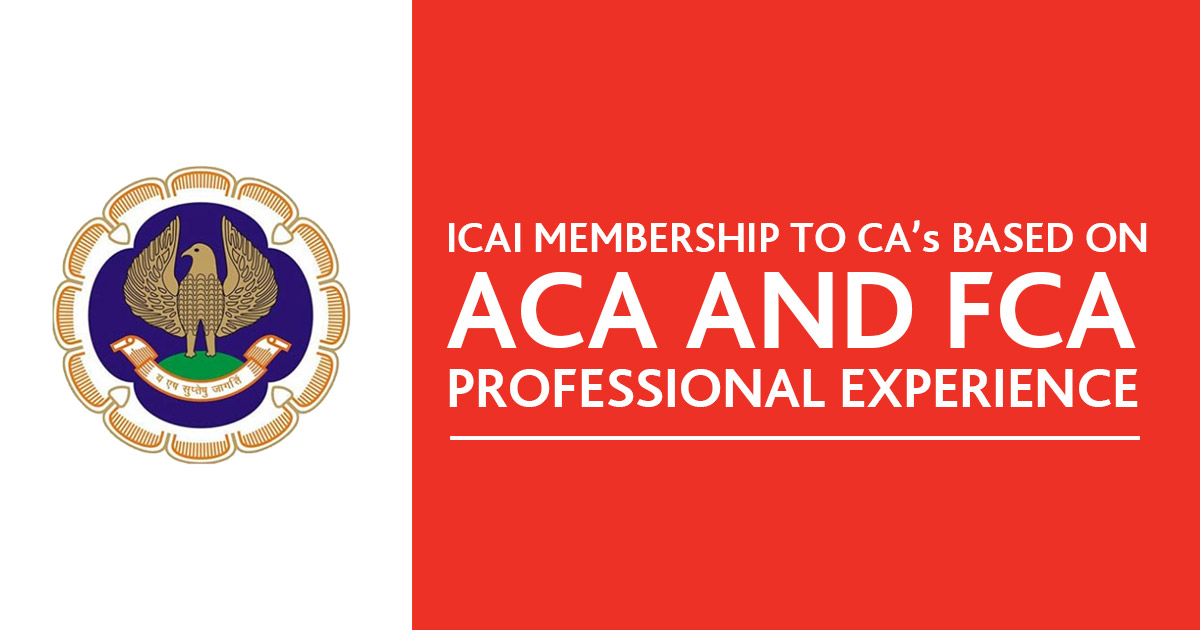
The term FCA is gaining popularity among youth. It is a designation obtained by a Chartered Accountant (CA). A designation of Associate Chartered Accountant (ACA) is been referred to the candidate who completes a CA. Compared to a newly appointed ACA, the professional who has more experience is designated as an FCA. Chartered Accountants or CAs are highly in demand for their talents by industries present across the globe. So if you like the idea of an established, well-rewarding and internationally renowned career, then you are most likely to take up CA as your profession.
The Institute of Chartered Accountants of India (ICAI) is the sole regulatory body for all that is happening in India related to the CA Profession. The institute offers CA courses to the aspirant students, it gives membership to the practising CA and allows the implementation of each rule related to CA.
CA memberships given by the Institute of Chartered Accountants of India (ICAI) are segregated into two segments, namely ACA and FCA. But before landing on the difference between the two, let’s have a glimpse of the renowned Chartered Accountancy Course.
About the Chartered Accountants Program
ICAI is the sole regulatory body in India responsible for providing CA Courses to CA aspirants as well as conducting and managing exams for the students. The program has three levels: Foundation, Intermediate, and Final.
The minimum eligibility to pursue the CA course is 10+2 in any stream from a well-known university or board. To be qualified as a CA in India, one needs to mandatorily clear the “final stage”. And to practice CA, one needs membership from the ICAI.
A 12th-passed student can apply for a ‘Foundation’ training and exam. After clearing the Foundation, one can enrol for an ‘Intermediate training and exam’, in the end, one can enrol for a three-year articleship offered by ICAI and a Final Exam, which needs to be cleared to be qualified as a CA.
Membership to CA is given either as ACA or FCA. Let’s have a quick look at the difference between the two:
As discussed above, membership is the only key to becoming a practicing CA, for which one needs to clear all three levels of the CA program. A CA or a member of ICAI can either be categorised as an Associate Chartered Accountant (ACA) or a Fellow Chartered Accountant (FCA) depending on their experience.
Associate Chartered Accountant (ACA)
First of all, clearing the CA final is a must for anyone who calls themselves a qualified CA. A Chartered Accountant who is granted this membership is a member of the ICAI for less than 5 years. The person is entitled to use the ACA initials behind his name. Some (especially those not practising the profession) opt not to become a Fellow member.
Overview of Fellow Chartered Accountant (FCA)
FCA stands for Fellow Chartered Accountant. The terms Fellow Chartered Accountant (FCA) and Associate Chartered Accountant (ACA) are not interchangeable, as they are both members of the Indian Council of Chartered Accountancy (ICAI) at different levels. ACA secures a certificate of practice for less than 5 years, while FCA is someone who secures a certificate of practice for more than 5 years.
A CA who has practised the profession with any of the government or private commercial organisations for 5 years or more can apply for membership to ICAI. There is a level above the ACA, i.e. FCA. The Fellow Chartered Accountant can use FCA initials after his name.
Duties of both the members (Associate Chartered Accountant and Fellow Chartered Accountant) remain the same, but the Fellow CA Members enjoy a bit of superiority over Associate CA Members. The FCA member of ICAI is privileged because he/she can get the chance to enter ICAI’s Council and Regional Councils after qualifying certain parameters. They enjoy supremacy over the ACA also because they have more experience and expertise in the field.
What is an Associate Chartered Accountant (ACA)
If a student has completed the professional accounting program from a professional accounting body, then he or she can become an associate member of an accounting body. When a person is placed as a Chartered accountant, then they will be entitled to the ACA. Hence, an ACA will be added to their names when addressing them.
Both such chartered accountant types come under the qualification of Professional accounting. ACA is an acronym for ASSOCIATE CHARTERED ACCOUNTANT, and FCA refers to the Fellow Chartered Accountant. Becoming an FCA is the height of your accounting career.
FCA (Fellow Chartered Accountant) and ACA (Associate Chartered Accountant) differ from each other in terms of experience level and seniority within the Indian Council of Chartered Accountancy (ICAI). An ACA is a Chartered Accountant who has passed the CA course and carries a certificate of practice, which is of not more than 5 years. FCA is a more senior member of ICAI with over 5 years of experience in the field.
Key Differences Between ACA and FCA
Key differences between ACA (Associate Chartered Accountant) and FCA (Fellow Chartered Accountant) are summarised below:
1. Qualification Level: In accounting, ACA is an entry-level qualification, and FCA signifies a higher level of achievement and recognition.
2. Experience Needed: To qualify for ACA, you should have 3 years of training. An FCA needs at least 10 years of experience in the accounting field.
3. Objective: An ACA holds that you have finished the basic professional training in accounting. FCA specifies that you have incurred achievements and secured expertise in your career.
4. Exam Requirement: Passing exams is important to become an ACA. FCA status is awarded based on your professional experience and contributions, therefore, no exams are there for this qualification.
5. Membership Status: An ACA is a new member of a professional accounting organization, and an FCA is a senior member with greater recognition and admiration.
6. Professional Contribution: There is a little role of ACA in the profession, and the members of the FCA are considered for their significant contributions and leadership.
7. Professional status: ACAs are skilled accountants who can manage complex tasks, but FCAs have the role of an experienced professional who influences the field.
8. Career Stage: ACAs are in the early to mid stages of their careers. FCAs are late-career professionals who are established in accounting.
9. Job Roles: ACAs frequently work in the positions of junior or mid-level, but FCAs often carry the role of senior leadership or consultancy.
10. Prestige of Qualifications: You would receive professional credibility by having an ACA, though it is not much more distinguished than an FCA title, which is recognized in the profession of accounting.






